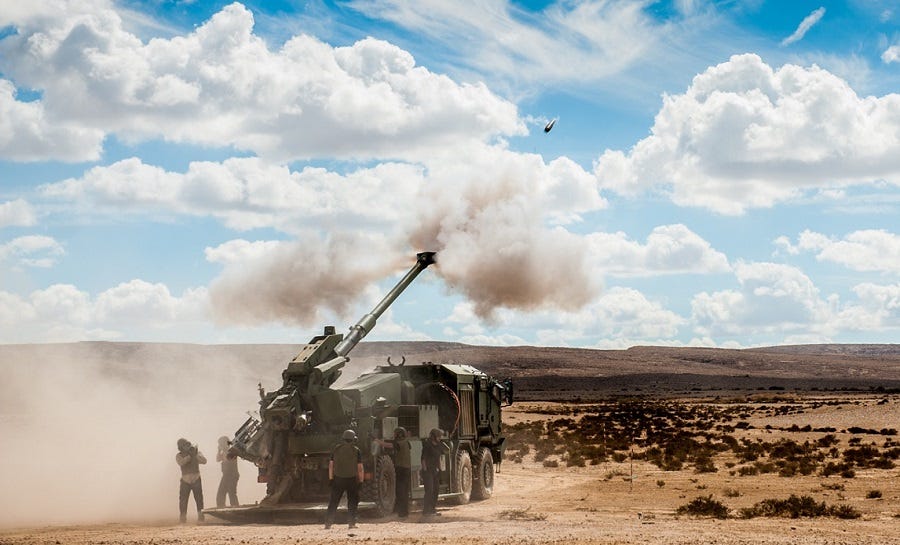Morocco-Israeli Elbit Systems Deal Advances its interests in Western Sahara and the Abraham Market
For Morocco, these defence deals strategically position the country ahead of Algeria in Western Sahara and regional economic integration efforts.
The Morocco-Israel relationship has deepened amidst the latter’s war on Gaza and in spite of mass protests against their normalisation, inking multiple multibillion-pound security deals, more than doubling trade, and allowing the passage of ships transporting vital weapons to Israel. Their most recent post-7 October milestone was Sunday’s deal with Israeli defence manufacturer Elbit Systems. Known for its ‘tried and true’ weapons capabilities on Palestinians, Elbit Systems was chosen as a recipient of the contract. The purchase, estimated at over $200 million, will help support Israel’s struggling post-war economy and foray into the African market. Furthermore, it cements the Abraham Market defense pillar as it expands other pillars such as connectivity and energy surpassing BRICS countries’ market making efforts.
Blossoming despite war: the Morocco-Israel Relationship
Elbit Systems, the Israeli manufacturer responsible for providing the overwhelming majority of land-based systems and drones to the Israeli Defence Forces (IDF), has been a major supplier of the Gaza genocide and consequently a target of Pro-Palestine Boycott Divest Sanction (BDS) campaigns. Antony Lowenstein’s book ‘The Palestine Laboratory’ details the company’s history of exploiting genocidal campaigns to advertise the capability of their weapons. This marketing strategy has succeeded in attracting large Moroccan purchases, making Israel the third-largest weapons supplier to the North African kingdom and contributing to the countries' ever-increasing trade relations, which doubled in 2023 and grew by 64% in the first five months of 2024. In turn, Morocco has been allowing the transport of weapons to Israel throughout the war.
The Elbit Systems contract will supply Morocco with 36 Autonomous Truck-Mounted Howitzer System (ATMOS) 2000 self-propelled howitzer artillery pieces instead of the previously agreed-upon Caesar system howitzers from KNDS France. The decision comes as a natural response to persistent technical failures, delays, and integration issues faced by the Royal Armed Forces (RAF) from the French supplier. Using Colombia’s purchase of the same pieces last year as a reference, where the Israeli company announced the contract sale was $102 million for 18 pieces, it is estimated that the recent Moroccan purchase is worth over $200 million. This deal further solidifies and adds material support to Rabat’s solidarity with Israel’s ethnic cleansing campaigns in Gaza and the West Bank. Morocco is effectively part of the Israeli war machine.
Race for the Sub-Saharan Market
In parallel with Israel, Morocco has also expanded defence cooperation with Turkey: this week, Turkish defence company Baykar sent their Akinci drones to Rabat and opened a maintenance hub and a local subsidiary, Altas Defence, just a week after announcing the establishment of a drone production factory in Morocco. Access to the African market is a primary driving force behind increased engagement with Morocco, as Turkey, among others, has been making military and economic inroads in West Africa, allegedly sending Free Syrian Army (FSA) mercenaries and leveraging Islamic soft power to invest in humanitarian aid in the conflict-ridden Sahel region.
For Morocco, these defence deals strategically position the country ahead of Algeria in their rivalry and ongoing dispute over Western Sahara by equipping its military with the most advanced technology available. In addition, they further align Rabat with Israel against Iran, which has had strained relations with Morocco due to its support for Sahrawi independence and alleged arming of the Polisario Front. Tehran has rejected these claims, however, and rapprochement negotiations have been ongoing since last November. Nevertheless, the Kingdom previously secured American and Israeli recognition of its sovereignty over Western Sahara in exchange for participating in the Trump-brokered Abraham Accords and stands to gain more in the US President’s second term. So, growing regional tensions and an aggressive administration almost guarantee a stalemate in potential rapprochement and increase the likelihood of confrontation in the disputed territory.



